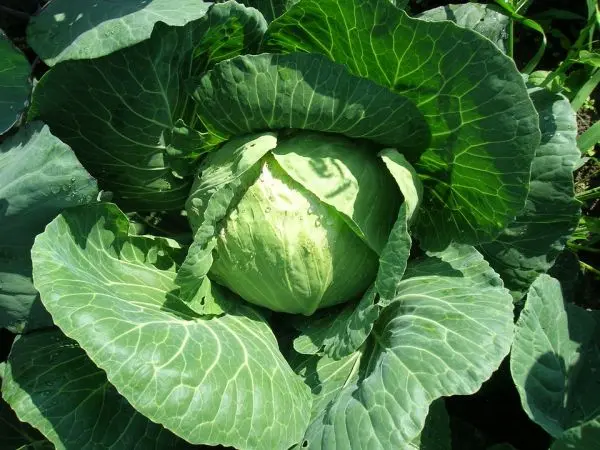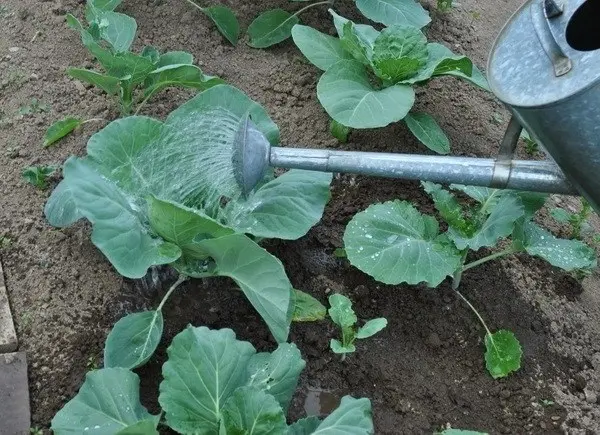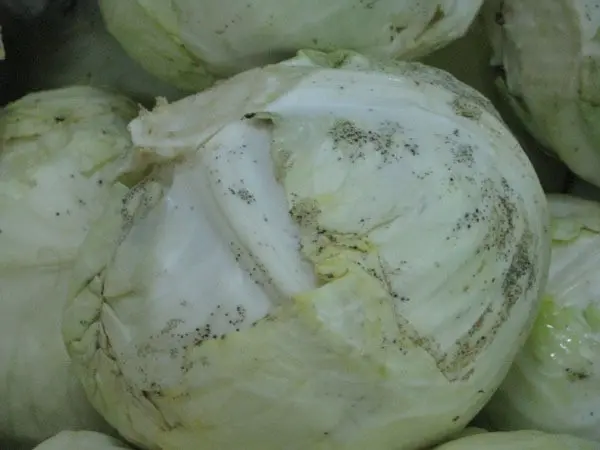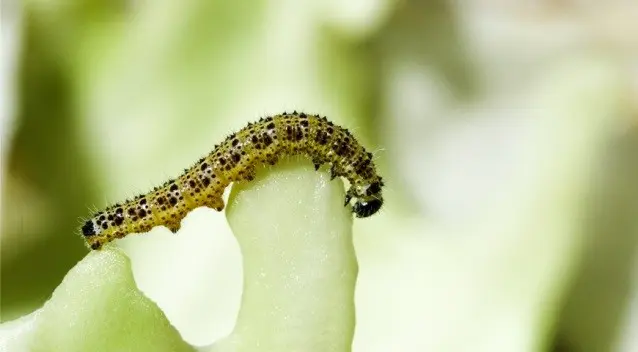Contents
The description of Golden Hectare cabbage shows what advantages and disadvantages this variety has, obtained by breeding methods in the middle of the 20th century. This variety has medium-sized heads of cabbage, weighing no more than 2.5-3 kg. The variety belongs to the early ones. According to the totality of characteristics, it is one of the most successful.
Description of the variety of cabbage Golden hectare
The root system of Golden Hectare cabbage is pivotal. The depth of its penetration into the soil is from 30 to 40 cm. Small roots go much deeper – up to 1 m.
The stem is a short and thick stalk. She’s very leafy. The color of the stem is white-green.

The leaves are round, rather large below, gray-green in color with veins.
In the upper part, small leaves are collected in round forks. They are white.
The leaf socket is slightly raised. It is small in size (circumference 60-75 cm). The leaves themselves are whole, located on short petioles. Their surface is smooth, in rare cases slightly wrinkled. The stalk inside the head is small.
The maturation period is from 100 to 110 days. The harvest is removed almost simultaneously, since ripeness occurs immediately in all specimens.
Pros and cons of cabbage varieties Golden hectare
The positive features of the Golden Hectare cabbage variety include:
- early and simultaneous maturation;
- high productivity;
- excellent taste;
- unpretentiousness in cultivation;
- excellent disease resistance;
- high pest resistance.
Negative aspects of culture:
- impossibility of long-term storage;
- poor portability.
It should be noted that among the early varieties of cabbage, the Golden Hectare has a fairly long shelf life – about 1 month. In other species, this figure is no more than 1 week.
Planting and caring for cabbage Golden Hectare
Cabbage Golden Hectare grows best in sunny areas with loamy soils. Depending on the climate, you can grow a crop in open ground or through seedlings. Planting of plants is carried out at a distance of 0,5-0,7 m from each other.
Seeds are planted in open ground at the end of April. With seedling cultivation, this is done at the end of March, and young plants are transferred to the beds in mid-May. In this case, the soil can be taken similar to that in the garden. Watering seedlings is done every 2-3 days, as the soil dries out, fertilizing before planting in open ground is not necessary.

Caring for adult plants is quite simple: watering twice a week for 5-10 liters, regular loosening of beds and destruction of weeds
Top dressing is done 3 times a season: in the middle and end of May and in the second decade of June. In all cases, a mixture of nitrogen and phosphorus-potassium fertilizers is used.
Cabbage yield Golden hectare
The yield of Golden Hectare cabbage is from 5 to 8 kg per square meter. Accordingly, up to 800 kg can be removed from a hundred. But these are indicators inherent in industrial cultivation. In a private garden or cottage, the yield decreases by 2-5 times. According to the reviews of those who cultivated the Golden Hectare variety, several tons are removed from ten acres.
Increasing yields can be achieved by denser planting of crops and compliance with agricultural practices. An increase in the volume of fertilizers and irrigation rates during cultivation is not justified, since the plant will not have time to process them, and a large amount of nitrates and sulfates will accumulate in its tissues. It will become impossible to use such cabbage.
Diseases and pests
The variety of cabbage Golden Hectare has good resistance to diseases and pests. There is nothing surprising in this, since it was for this that the culture was bred. Breeders have made every effort to isolate a stable and unpretentious variety.
But, despite this, with a serious deviation from agrotechnical standards, various fungal infections can attack Golden Hectare cabbage. First of all, this applies to plants that are watered too abundantly.
One of the most common diseases is powdery mildew. Its symptoms are known to any gardener. With it, various parts of the plant are covered with powdery coating several millimeters thick.

A feature of powdery mildew on cabbage are black dots – a manifestation of tissue necrosis
The reason for the appearance of the fungus that causes the disease is the plant residues of the previous year, which contain its spores. The active phase of the treatment of the disease involves the use of Phytoftorin and Ridomil. If there is no desire to use such powerful means, you can get by with a simpler one: spraying with a 1% solution of Bordeaux mixture.
But it is best to carry out preventive measures in the form of soil treatment with copper-containing preparations some time before planting the crop in open ground. This may be the already mentioned Bordeaux mixture or a solution of copper sulfate.
Of the pests characteristic of cruciferous cabbages, golden hectare can be affected by whites during the years of mass summer. This is the main enemy of culture, periodically appearing even on the most resistant varieties.

The main problem is not adult whites, but their larvae, which have a characteristic color.
During the summer, from 2 to 3 generations of butterflies can change. In fact, the fourth leaves for wintering. Since the Golden Hectare cabbage variety is early, it falls under the first two generations of the pest. Moreover, one will parasitize on young plants, and the second – on those already ready for harvest.
No other pest, even cruciferous fleas, has such a detrimental effect on cabbage, so whites should be dealt with especially carefully, regularly inspecting plants for caterpillars and eggs.
Fortunately, whitefish does not have good resistance to poisons, and drugs that are not particularly dangerous to humans can be used to neutralize it. These include Karbofos, Iskra M and others.
Application
Since Golden Hectare cabbage is an early ripening variety, its shelf life is short, no more than a month. Therefore, the harvested crop needs to be consumed or processed as soon as possible.
It is used raw in various salads, the first and second courses, as well as pies are made from the Golden Hectare. For consumption at a later date, preservation is used. Salted and sauerkraut Golden Hectare is able to retain good taste and most of the vitamin composition for 3-4 months. With conservation with sterilization, these periods can be extended up to 5-7 months.
Conclusion
The description of Golden Hectare cabbage gives an idea of its main characteristics and advantages. This is an early ripe variety with high yield and excellent taste. Growing Golden Hectare cabbage is relatively simple, and even a novice gardener can handle it. The main disadvantage of the culture is the short shelf life of the harvested crop, which is no more than a month.









